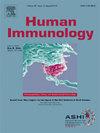Does hydroxychloroquine intervention improve pregnancy outcomes in patients with recurrent pregnancy loss who are positive for antinuclear antibodies?
IF 2.2
4区 医学
Q3 IMMUNOLOGY
引用次数: 0
Abstract
Whether hydroxychloroquine intervention can improve pregnancy outcomes in patients with recurrent pregnancy loss patients (RPL) with antinuclear antibodies (ANAs) positive is still unknown.
RPL patients who were positive for ANAs without rheumatism were recruited from the Reproductive Medicine Center of the Second Affiliated Hospital of Soochow University from January 2016 to December 2023 (N = 104). Normal healthy pregnant women were selected as the Control group (N = 100). ANA-positive pregnant women who had experienced one sporadic abortion were included in the SA group (N = 42). Patients in both RPL and SA groups received 0.2–0.4 g hydroxychloroquine daily. General data and pregnancy outcomes were compared among the three groups. Patients with RPL were divided into three subgroups according to ANA titers: 1:100 (n = 81), 1:320 (n = 18) and 1:1000 (n = 5). The differences in the pregnancy outcomes among the subgroups were compared.
We found the abortion rates in RPL and SA groups were greater than that in the control group (P < 0.05). The incidence of pregnancy complications was greater in the RPL group than in the control group (P < 0.05). The full-term live birth rates in RPL and SA groups were lower than that in the control group (P < 0.05). There were significant differences in the abortion rate among patients with RPL with different ANA titers (P < 0.05).
We concluded that adverse pregnancy outcomes, such as abortion and complications during pregnancy, are still more common in ANA-positive RPL patients than in normal pregnant women despite treatment. The ANA titer is closely related to the abortion rate among RPL patients during sequent pregnancy.
羟氯喹干预是否能改善抗核抗体阳性的复发性流产患者的妊娠结局?
羟氯喹干预是否能改善抗核抗体(ANAs)阳性的复发性妊娠丢失患者(RPL)的妊娠结局尚不清楚。招募2016年1月至2023年12月苏州大学第二附属医院生殖医学中心ANAs阳性且无风湿的RPL患者(N = 104)。选取正常健康孕妇作为对照组(N = 100)。有1次散发性流产的ana阳性孕妇为SA组(N = 42)。RPL组和SA组患者每日服用0.2 ~ 0.4 g羟氯喹。比较三组的一般资料和妊娠结局。根据ANA滴度将RPL患者分为1:100 (n = 81)、1:20 20 (n = 18)和1:1000 (n = 5)三个亚组。比较各亚组妊娠结局的差异。RPL组和SA组流产率均高于对照组(P < 0.05)。RPL组妊娠并发症发生率高于对照组(P < 0.05)。RPL组和SA组足月活产率均低于对照组(P < 0.05)。不同ANA滴度的RPL患者流产率差异有统计学意义(P < 0.05)。我们的结论是,尽管接受了治疗,但ana阳性RPL患者的不良妊娠结局,如流产和妊娠期间并发症,仍比正常孕妇更常见。ANA滴度与RPL患者随后妊娠的流产率密切相关。
本文章由计算机程序翻译,如有差异,请以英文原文为准。
求助全文
约1分钟内获得全文
求助全文
来源期刊

Human Immunology
医学-免疫学
CiteScore
5.40
自引率
7.40%
发文量
107
审稿时长
12 days
期刊介绍:
The journal''s scope includes understanding the genetic and functional mechanisms that distinguish human individuals in their immune responses to allografts, pregnancy, infections or vaccines as well as the immune responses that lead to autoimmunity, allergy or drug hypersensitivity. It also includes examining the distribution of the genes controlling these responses in populations.
Research areas include:
Studies of the genetics, genomics, polymorphism, evolution, and population distribution of immune-related genes
Studies of the expression, structure and function of the products of immune-related genes
Immunogenetics of susceptibility to infectious and autoimmune disease, and allergy
The role of the immune-related genes in hematopoietic stem cell, solid organ, and vascularized composite allograft transplant
Histocompatibility studies including alloantibodies, epitope definition, and T cell alloreactivity
Studies of immunologic tolerance and pregnancy
T cell, B cell, NK and regulatory cell functions, particularly related to subjects within the journal''s scope
Pharmacogenomics and vaccine development in the context of immune-related genes
Human Immunology considers immune-related genes to include those encoding classical and non-classical HLA, KIR, MIC, minor histocompatibility antigens (mHAg), immunoglobulins, TCR, BCR, proteins involved in antigen processing and presentation, complement, Fc receptors, chemokines and cytokines. Other immune-related genes may be considered.
Human Immunology is also interested in bioinformatics of immune-related genes and organizational topics impacting laboratory processes, organ allocation, clinical strategies, and registries related to autoimmunity and transplantation.
 求助内容:
求助内容: 应助结果提醒方式:
应助结果提醒方式:


